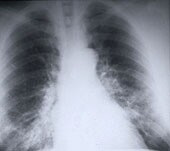
WEDNESDAY, July 6 (HealthDay News) — Women, older people and minorities are under-represented in lung cancer drug trials in the United States, according to a new study.
Researchers say that this could have a significant impact on the efficacy and safety of new treatments among these groups, particularly the elderly.
“Our results suggest that the trial population used for approval of drugs do not represent well the U.S. population who may receive the marketed agent,” the study’s principal investigator, Dr. Shakun Malik, a medical officer at the U.S. Food and Drug Administration in Silver Spring, Md., said in a news release.
“This fact is concerning particularly for older patients who may experience greater toxicity when given the same dose and combination of drugs based on testing in a younger population,” Malik explained in the release from the International Association for the Study of Lung Cancer.
In conducting the study, which was slated for presentation Wednesday at the 14th World Conference on Lung Cancer in Amsterdam, researchers reviewed 10 years of trial data for the treatment of non-small cell lung cancer submitted to the U.S. Food and Drug Administration.
The study revealed that although 42 percent of patients diagnosed with lung cancer in the United States between 1975 and 2008 were women, only 32 percent of enrollees in 10 national and international drug trials for non-small cell lung cancer between 2000 and 2010 were women.
Moreover, although 73 percent of lung cancer patients in the United States are older than 65, only 36 percent of the drug trial population was in that age group.
Blacks also develop lung cancer at higher rates than whites, but they only comprised 2 percent of trial participants in the 10-year period, the study found. Meanwhile, researchers noted that whites made up 78 percent of enrollees, Asians comprised 15 percent, Hispanics 2 percent and “other” accounted for 2 percent.
Because this study was presented at a medical meeting, the data and conclusions should be viewed as preliminary until published in a peer-reviewed journal.
More information
The U.S. National Cancer Institute provides more information on lung cancer treatment.

